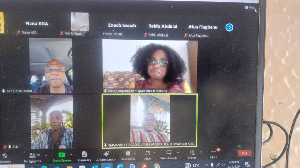Ben Dotsei Malor, Chief Editor of Dailies at the UN News and Media Division of the United Nations Department of Global Communications, has expressed concerns about Ghanaians' disrespect for time.
The UN official noted that the unfortunate routine seems to have been accepted by all, thereby causing the country to lose a lot in terms of productivity.
"We have normalized the abnormal, accepted the unacceptable, tolerated the intolerable, defended the indefensible and condoned what should be condemned," Dotsei Malor said in an episode of the online Time Keeping Dialogue series on Sunday, April 28.
The dialogue, hosted by Georgina Asare Fiagbenu, a Communications for Development advocate, was themed "From 'Ghana Man Time' to Greenwich Mean Time - Lessons from the Diaspora."
Mr Dotsei Malor, who has travelled to several countries due to the nature of his work, acknowledged that the issue is not unique to Ghanaians, citing Ecuador, where in 2003 the government declared a state of emergency to address chronic lateness estimated to cost the country $2.5 billion annually.
However, the former BBC editor said the issue is more damaging in Ghana compared to other countries.
On her part, Kirstie Angsmann, a member of the Migrants Council and Women's Commission in Freiburg, Germany, noted that "the issue is more about environment and structure than race," contrary to perceptions that it is prevalent among Black people.
She explained that in Germany, the system is structured such that excuses like "my car broke down" or "I was stuck in traffic" are not tolerated.
"They believe in communication - informing them in a timely manner with tangible reasons for why you will be late. Otherwise, there will be a penalty," she said.
Effect
Mr. Dotsei Malor asserted that the disrespect for time, where a program scheduled to start at 10 AM and end at 12 PM eventually begins at 11:30 AM, is largely why most Ghanaians are poor and the economy is in a bad state.
"Being time-conscious means increased productivity, and productivity means efficiency. A lack of this results in inefficiency, lack of success and other problems," he stated.
Solution
Among others, Mrs. Kirstie Angsmann, a Ghanaian woman married to a German, noted that Ghanaians need to take every bit of their time seriously, just as it is done in Germany.
“It's essential to understand the importance of time and use it wisely,” said Kirstie Angsmann.
She cited an instance where her husband visited Ghana and they attended a program that was delayed for hours before it started, and how angry the husband was.
According to Mr. Dotsei Malor, acknowledging the impact of time wasting is a step in eradicating the seeming “Ghanaman time” that has persisted for years.
“Another key thing is also a situation whereby leaders lead by example, like it was during the time of late Professor Atta Mills, who would be at a function on time,” he said.
Others who joined the meeting also shared their views on how the issue can be resolved, such as a shift in mindset and a situation whereby leadership sets the tone at the top for everyone to follow.
The dialogue explored the concepts of "Ghanaman Time" and Greenwich Mean Time, differences in time perception between Ghanaian and Western cultures, and how these differences impact business practices.
Additionally, it discussed the diaspora's views on time, lessons for improving time management and productivity, and the role of policymakers in changing the Ghanaian perception of time.
General News of Monday, 29 April 2024
Source: Isaac Kofi Dzokpo, Contributor

















